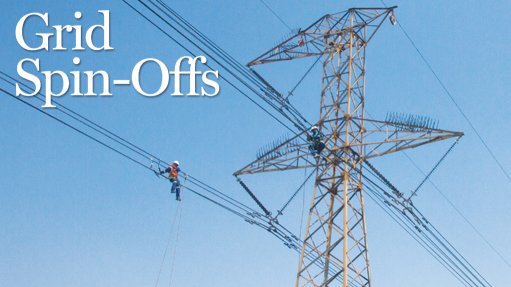Marginal gains critical in gaining competitive advantage



DUNCAN GRAHAM Marginal gains refer to small incremental improvements in any process, subsequently resulting in a significant improvement overall
FULL CONTROL Grundfos full control and balancing with the ALPHA3 connected circulator pump directly to mobile device
The compounding effect of not taking advantage of marginal gains has a significant impact on the way in which an organisation operates, says pump manufacturer Grundfos commercial building services sales manager Duncan Graham.
Marginal gains refer to small incremental improvements in any process, subsequently resulting in a significant improvement overall, which, if used correctly, could provide any company with a “competitive advantage”, owing to reduced downtime and improved operating performances.
The consequence of not considering marginal gains will affect critical components, resulting in a compounding negative effect for the organisation and process, ultimately leading to, for example, increased downtime and delays.
While the advantages, in isolation, are considered to be “relatively low level”, Graham explains that these advantages combined could result in increased overall process efficiency, extended product lifespan, reduced maintenance and reduced cost of ownership.
Historically, hydraulic efficiency was the primary indicator of a pump’s efficiency, although it was “one very small component” of how well a pump was suited to integrate into a system.
System communication and a reduction in maintenance costs and time could also provide end-users with a “much more holistic view of how effectively a pump will operate within the system”.
However, in a highly competitive industry, Graham urges end-users to consider the pump “as an integral part of the process” and to consider how best the pump could alleviate “pain points” in the process.
He adds that one should “have a clear understanding of the system” and its overall health.
Integration continues to play a key role, with end-users taking into account the pump criteria – such as head, flow or power requirements – based on what the pump is expected to do.
Graham notes that as organisations become more competitive, marginal differences and how well a pump integrates into the system are becoming more important.
Ensuring that the correct pump is selected requires that an organisation look beyond the specific isolated situation in which the pump may operate.
“Rather, organisations will need to look closely at how well the pump integrates into their system,” he adds.
This is where Grundfos’ expertise is valuable, as its products “generally have a high level of integration and benefit from marginal gains throughout its product offering”, says Graham.
Data is King
Graham laments that one of the most misleading assumptions about data is that “once you have the data, you have information about your system”.
While information is associated with knowledge, he explains that it only truly becomes knowledge when the data becomes usable and when people understand how to use the information now available on their systems.
“That’s really important for the Grundfos product offerings because we need to look beyond just trying to provide data on the system. We need to ensure that it comes across in a usable fashion so that the end-user gains the benefit from the product offering,” he comments.
Grundfos products interpret the data and information in such a way that the end-user understands various aspects such as friction loss calculation and proportional pressure differences.
“That’s also one of the key aspects of marginal gains – being able to use this information beyond data,” Graham says, noting that Grundfos helps to understand “the pain points” beyond simply ensuring that the end-user has an operating pump.
This, he notes, ties back into the system requirements, as data can now contribute to a marginal gain for the end-user.
Products
While Grundfos focuses on the intelligence of the pump motors and how these motors can provide end-users with actual information about and live feeds of their system, Graham says the industry has been moving towards “neater solutions”, which are often more compact, efficient and have a higher integration capability.
Graham highlights Grundfos’ I-Solutions and E-Product ranges as popular options among industry end-users and stakeholders.
The company has also integrated variable-speed drives (VSDs) into its pump products. While this is not necessarily a unique market offering, Graham highlights that the information that becomes available from using the intelligence built into the Grundfos VSDs offers greater system information. This is another measure the company has taken to provide end-users with usable and intelligent information.
“In some cases, our products can alert end-users to a spares requirement, maintenance or even call out technicians if required.”
The company’s pumps range offering is associated with the company’s Hydro Multi-Pump Controller booster, Hydro Multi-E boosters and in-line pumps such as the TPEs, which Graham says “all hold a high level of integration and intelligence in the motors while in a self-contained unit, making interface integration that much easier for the end-user”.
Article Enquiry
Email Article
Save Article
Feedback
To advertise email advertising@creamermedia.co.za or click here
Press Office
Announcements
What's On
Subscribe to improve your user experience...
Option 1 (equivalent of R125 a month):
Receive a weekly copy of Creamer Media's Engineering News & Mining Weekly magazine
(print copy for those in South Africa and e-magazine for those outside of South Africa)
Receive daily email newsletters
Access to full search results
Access archive of magazine back copies
Access to Projects in Progress
Access to ONE Research Report of your choice in PDF format
Option 2 (equivalent of R375 a month):
All benefits from Option 1
PLUS
Access to Creamer Media's Research Channel Africa for ALL Research Reports, in PDF format, on various industrial and mining sectors
including Electricity; Water; Energy Transition; Hydrogen; Roads, Rail and Ports; Coal; Gold; Platinum; Battery Metals; etc.
Already a subscriber?
Forgotten your password?
Receive weekly copy of Creamer Media's Engineering News & Mining Weekly magazine (print copy for those in South Africa and e-magazine for those outside of South Africa)
➕
Recieve daily email newsletters
➕
Access to full search results
➕
Access archive of magazine back copies
➕
Access to Projects in Progress
➕
Access to ONE Research Report of your choice in PDF format
RESEARCH CHANNEL AFRICA
R4500 (equivalent of R375 a month)
SUBSCRIBEAll benefits from Option 1
➕
Access to Creamer Media's Research Channel Africa for ALL Research Reports on various industrial and mining sectors, in PDF format, including on:
Electricity
➕
Water
➕
Energy Transition
➕
Hydrogen
➕
Roads, Rail and Ports
➕
Coal
➕
Gold
➕
Platinum
➕
Battery Metals
➕
etc.
Receive all benefits from Option 1 or Option 2 delivered to numerous people at your company
➕
Multiple User names and Passwords for simultaneous log-ins
➕
Intranet integration access to all in your organisation




















